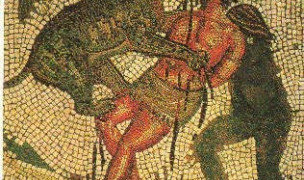 20 词条
20 词条主页 > 词条 > 马其顿语(MK) > симбол
симбол
A person, object, image, word, or event that evokes a range of additional meaning beyond and usually more abstract than its literal significance. Symbols are educational devices for evoking complex ideas without having to resort to painstaking explanations that would make a story more like an essay than an experience. Conventional symbols have meanings that are widely recognized by a society or culture. Some conventional symbols are the Christian cross, the Star of David, a swastika, or a nation’s flag. Writers use conventional symbols to reinforce meanings. Kate Chopin, for example, emphasizes the spring setting in "The Story of an Hour" as a way of suggesting the renewed sense of life that Mrs. Mallard feels when she thinks herself free from her husband. A literary or contextual symbol can be a setting, character, action, object, name, or anything else in a work that maintains its literal significance while suggesting other meanings. Such symbols go beyond conventional symbols; they gain their symbolic meaning within the context of a specific story. For example, the white whale in Melville’s Moby-Dick takes on multiple symbolic meanings in the work, but these meanings do not automatically carry over into other stories about whales. The meanings suggested by Melville’s whale are specific to that text; therefore, it becomes a contextual symbol. See also allegory.
您想要说什么?
新闻词条
精选词条
phylum placozoa
Macroscopic, flattened marine animals, composed of ventral and dorsal epithelial layers enclosing ...
phylum cnidaria
Cnidarians. Hydras, hydroids, jellyfish, sea anemones, and corals. Free-swimming or sessile, with ...
share a term with millions
Share a term with millions of users around the world and increase your online visibility.Share a ...
oak
Genus native to the Northern Hemisphere with spirally arranged leaves, catkins for flowers and ...
Everest
The last but not least mount Everest. The Earth's highest mountain, with a peak at 8,848 metres ...
aglaonema
Genus of about 20 species of usually rhizomatous, evergreen perennials from tropical forest in Asia. ...
Robojelly
Robojelly is a hydrogen-powered robot desgined in the United States that moves through the water ...
Ferdinand Porsche
Ferdinand Porsche (3 September 1875 – 30 January 1951) was an Austrian-German automotive engineer ...
Marzieh Afkham
Marzieh Afkham, who is the country’s first foreign ministry spokeswoman, will head a mission in east ...
精选词汇表
按照类别浏览术语
- Aeronautics(5992)
- 空中交通管制(1257)
- 机场(1242)
- 飞机(949)
- Aircraft maintenance(888)
- Powerplant(616)






